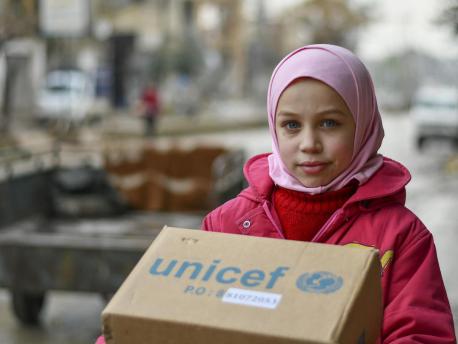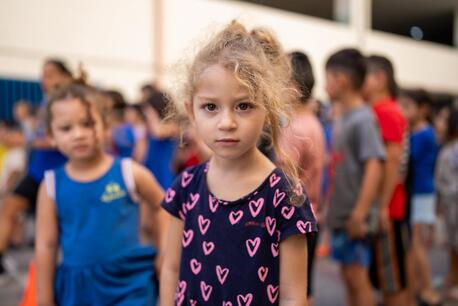
Kids Born Into Syria's Decade-Long Civil War Need Help Now
Children born in the ten years since the start of the Syrian civil war have no memory of peace, just the hope that someday, the daily uncertainties of life under siege will give way to a safer, brighter future.
In rural Damascus, neighborhoods have been reduced to ruins. Bombed-out buildings stand empty, frozen in mid-collapse. "There are still families living amidst this destruction," said Sandra Awad, a UNICEF facilitator. "Still, every day, they go to work, and children go to school."
One mother told Awad the most difficult time for her is at night, when temperatures drop. "She doesn't have windows or doors in her home, and she can't keep her children warm. She says, 'I see them shivering from the cold.' "
Awad helps families get the supplies and services they need to survive the harsh winter and keep their children healthy: sturdy shoes for kids who have nothing but plastic sandals, coats to help children stay warm at home and on the long walk to school.
Ten long years of war have had a devastating impact on children and their childhoods. Ongoing violence, economic crisis and the rapidly evolving COVID-19 pandemic are making a bad situation even worse. Nearly 90 percent of Syria's children are in need of humanitarian assistance, a 20 percent increase from last year.
Over the past decade, UNICEF has provided lifesaving interventions to children in Syria and Syrian refugee families in neighboring countries. In 2020 alone, nearly 900,000 children received routine immunizations or vaccination against measles; over 400,000 children were reached with psychosocial support; over 3.7 million children had access to formal or informal education; over 5.4 million people received safe water through water supply improvements; and more than 55 million people were reached with health safety information on how to prevent the spread of COVID-19.
There is much more to be done.
“This cannot be just another grim milestone, passing by in the world’s peripheral vision as children and families in Syria continue to struggle,” said UNICEF Executive Director Henrietta Fore. “Humanitarian needs cannot wait. The international community should make every effort to bring about peace to Syria and galvanize support for its children.”
Your generous contribution will help UNICEF reach vulnerable children with the supplies and services they desperately need to survive and thrive. Please donate.
Top photo: Najwa, 10, receives a box of new winter clothes from UNICEF in Hammourieh, rural Damascus, Syria. © UNICEF/UNI289861/Shahan
HOW TO HELP
There are many ways to make a difference
War, famine, poverty, natural disasters — threats to the world's children keep coming. But UNICEF won't stop working to keep children healthy and safe.
UNICEF works in over 190 countries and territories — more places than any other children's organization. UNICEF has the world's largest humanitarian warehouse and, when disaster strikes, can get supplies almost anywhere within 72 hours. Constantly innovating, always advocating for a better world for children, UNICEF works to ensure that every child can grow up healthy, educated, protected and respected.
Would you like to help give all children the opportunity to reach their full potential? There are many ways to get involved.





